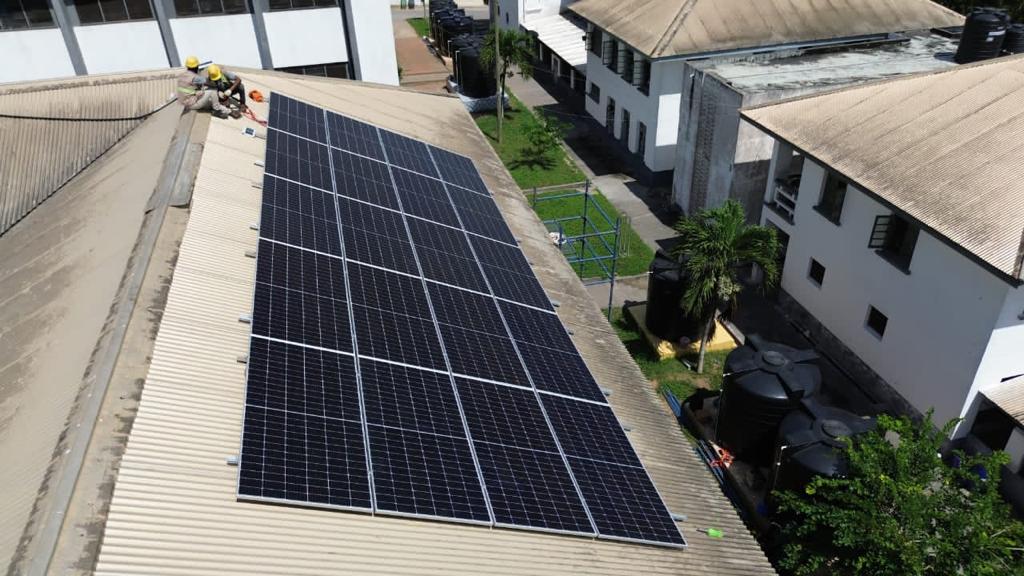
For decades, Ghana has operated within a linear economic model: extract resources, manufacture products, use them, discard them. This “take-make-waste” approach has driven economic growth but at tremendous environmental and social cost.
Our gutters overflow with plastic waste, our beaches are littered with bottles, and we ship millions of dollars abroad annually to import virgin materials that we then throw away after a single use. But a fundamental reimagining of how we produce, consume, and manage materials is gathering momentum—the circular economy revolution. At its heart in Ghana lies the transformative potential of recycled PET plastics.
Understanding Circular Economy: More than Just Recycling
The circular economy represents a paradigm shift from viewing waste as an endpoint to recognising it as a resource. Unlike the linear model, where products have a finite lifecycle ending in disposal, circular systems design waste out of the system entirely. Materials flow in continuous loops—products are designed for durability, reparability, and eventual remanufacturing, with materials perpetually cycling through productive use.
The Mohinani rPET initiative exemplifies this circular vision. By establishing infrastructure to collect Ghana’s 900 million discarded PET bottles annually and process them into high-quality recycled content, the project closes the loop that currently haemorrhages both environmental health and economic value. Each tonne of rPET produced is one tonne less virgin plastic imported, one tonne less fossil fuel extracted, and one tonne less waste contaminating our communities.
Closed-Loop Manufacturing: The Technical Foundation
Closed-loop manufacturing ensures that materials exiting a product’s use phase become inputs for manufacturing new products of equivalent quality. For PET plastics, this means collecting used bottles, processing them through washing, shredding, and extrusion, and producing recycled resin that meets food-grade standards—capable of safely containing beverages just like virgin PET.
The technical sophistication required for food-grade rPET is considerable, which is why Ghana’s rPET initiative requires significant capital investment—estimated at $15-20 million—for world-class processing equipment. But this investment pays dividends by ensuring that recycled PET can genuinely substitute for virgin material rather than being downcycled into lower-value applications.
Closed-loop systems create economic incentives that align with environmental goals. When beverage producers can source quality rPET domestically rather than importing virgin PET, they reduce costs while meeting growing consumer demands for sustainable packaging. When waste pickers have guaranteed buyers for collected bottles at fair prices, they formalise their livelihoods while cleaning communities. When government reduces foreign exchange spending on plastic imports—saving up to $27 million annually—it frees resources for other development priorities. Everyone wins—a hallmark of well-designed circular systems.
SDG 12: Responsible Consumption and Production
The circular economy is not just sound business strategy—it is central to achieving global sustainability commitments. Sustainable Development Goal 12 calls for ensuring sustainable consumption and production patterns, recognising that our current trajectory of resource extraction and waste generation is environmentally catastrophic and economically unsustainable.
The rPET initiative directly advances multiple SDG 12 targets. It promotes sustainable management and efficient use of natural resources by recycling bottles rather than importing virgin plastic derived from petroleum—the project’s potential to process 18,000 tonnes annually represents massive resource conservation. It addresses environmentally sound management of wastes, tackling Ghana’s plastic crisis where bottles clog drainage systems and create flooding risks. It substantially reduces waste generation through recycling and reuse, transforming waste from a disposal problem into a manufacturing resource.
Perhaps most importantly, the initiative ensures that Ghanaians have relevant information and awareness for sustainable development through public awareness campaigns, school education programs, and community engagement efforts—helping shift mindsets so bottles are seen as valuable resources, not trash.
Ghana’s progress on SDG 12 has been uneven, but initiatives like rPET recycling demonstrate that sustainability and development are not trade-offs—they are mutually reinforcing. Economic benefits ($27 million in annual savings, 3,000 jobs created) combined with environmental gains (27,000-45,000 tonnes CO? avoided annually) exemplify how SDG 12’s vision delivers tangible improvements in Ghanaian lives.
Beyond Waste Management: A Long-Term Sustainability Vision
The circular economy revolution transcends waste management. The deeper transformation involves reimagining Ghana’s relationship with materials, energy, and economic value creation. This long-term vision encompasses several critical dimensions:
Industrial Diversification: Rather than exporting raw materials cheaply and importing finished products expensively, circular economy industries like rPET recycling allow Ghana to process and manufacture locally, retaining more economic value. This diversifies Ghana’s economy beyond primary commodity exports vulnerable to price volatility.
Energy Transition: The rPET process uses 70% less energy than producing virgin PET from petroleum. As Ghana pursues renewable energy development and energy security, circular industries that minimise energy intensity become strategic assets, offering lower operational costs and reduced greenhouse gas emissions.
Skills and Innovation: Building a circular economy develops new technical capacities in recycling technology, supply chain logistics, and quality control. Young Ghanaians trained in recycling operations can become entrepreneurs launching complementary ventures, creating a knowledge economy around sustainable manufacturing.
Regional Leadership: No West African country has yet emerged as the region’s circular economy leader. Ghana, through initiatives like the Mohinani rPET project, can claim this position—bringing economic opportunities through exporting recycled materials, providing technical assistance to neighbouring countries, and attracting climate finance.
Urban Livability: Circular systems that capture plastic waste before it enters the environment make cities cleaner, safer, and more attractive. Flooding from plastic-clogged drainage costs lives and damages property. The rPET initiative addresses this crisis, making it essential urban development, not just environmentalism.
Climate Resilience: By reducing greenhouse gas emissions through avoided virgin production, building green industries resilient to fossil fuel price shocks, and demonstrating climate leadership that attracts international support, circular economy initiatives strengthen Ghana’s climate resilience.
The Cultural Shift: From Disposal to Stewardship
Perhaps the most profound aspect of the circular economy revolution is cultural. For generations, disposability has been seen as progress. But this convenience has proven catastrophically expensive—environmentally, economically, and socially.
The circular economy invites Ghanaians to embrace a different definition of progress—one where stewardship replaces disposal, where products are designed to cycle rather than be destined for landfills. This is not regression but advancement toward a future where materials are abundant because they never leave the economic cycle.
This cultural shift requires education, awareness, and changed social norms. When schoolchildren contribute to collection programs, they internalise circular thinking. When communities take pride in recycling rates, social pressure reinforces sustainable behaviour. The Mohinani rPET initiative, through its community engagement and public awareness components, recognises that circular economy infrastructure must be embedded in supportive cultural contexts where recycling is normal, valued, and celebrated.
From Aspiration to Action: Ghana’s Circular Economy Roadmap
Ghana has articulated circular economy aspirations in policy documents and ministerial speeches. The rPET initiative represents a critical test of whether these aspirations can become an operational reality. Success requires coordinated action across multiple fronts:
The government must align policies through Extended Producer Responsibility, minimum recycled content mandates, and tax incentives for recycling infrastructure. Investment must be mobilised through green bonds, climate finance, and public-private partnerships. Value chains must be developed with robust collection networks, efficient logistics, and quality processing. Capacity must be built through educational institutions and industry partnerships. And progress must be transparently monitored through rigorous measurement systems involving EPA, MESTI, and independent verifiers.
The Mohinani rPET project, by addressing all these dimensions, provides a template for Ghana’s broader circular economy transition. If successful, it demonstrates that circular systems can be environmentally effective, economically viable, and socially beneficial.
Conclusion: Revolution or Business as Usual?
Ghana faces a choice. We can continue with business as usual—importing virgin plastics, using them once, discarding them carelessly, and watching our environment degrade while our economy haemorrhages foreign exchange. Or we can embrace the circular economy revolution—transforming waste into wealth, creating thousands of jobs, reducing emissions, and positioning Ghana as a regional leader in sustainable development.
The linear model that served previous generations cannot support Ghana’s growing population and rising aspirations without triggering environmental collapse. The circular model offers a pathway to prosperity that respects planetary boundaries and creates broad-based opportunity.
The Mohinani rPET initiative, aligned with SDG 12 and circular economy principles, represents Ghana’s commitment to choosing revolution over business as usual. Every bottle collected is a vote for Ghana’s sustainable future. Every job created is an investment in inclusive growth. Every tonne of CO? avoided is a contribution to climate action.
The revolution has begun. The question is not whether Ghana will participate but whether Ghana will lead. The answer depends on choices we make today—in policy chambers, boardrooms, communities, and individual households. Ghana’s plastic future is ours to design. Let us make it circular.
The post The circular economy revolution: Rethinking the plastic future: From The Customer-centric Entrepreneur Project appeared first on The Business & Financial Times.
Read Full Story



















Facebook
Twitter
Pinterest
Instagram
Google+
YouTube
LinkedIn
RSS